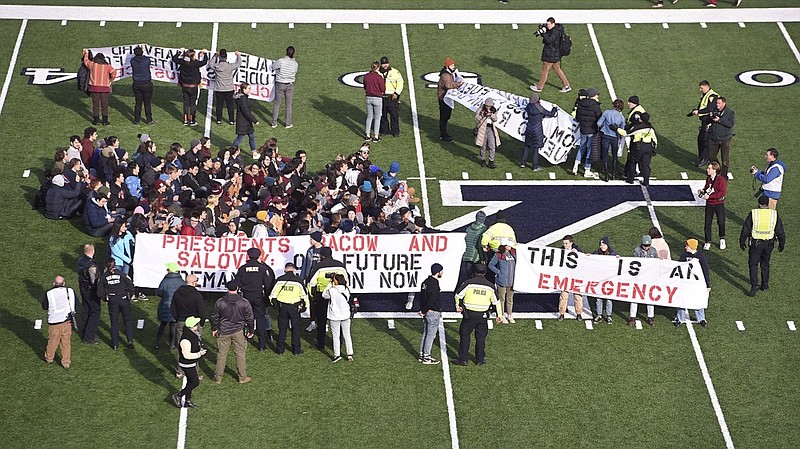Ah, just another fall Saturday in New England. Thousands flock to Ivy League football games, exit their Bugattis and their Teslas with their silver flasks expertly hidden, their trust-fund children secure in their educational and career futures, and in time a protest breaks out. What could be more appropriate?
No national title was on the line for the 136th edition of the Harvard-Yale game, no playoff implications, no Heisman Trophy winner intrigue, only annual bragging rights at New York City securities firm water coolers and Democratic fundraisers.
Halftime was just about over, the Yale band having finished its musical numbers, when students from both schools left the stands and occupied midfield this past Saturday.
Some held banners, insisting their universities get rid of investments they believe add to climate change. Others displayed their interest in furthering Puerto Rico debt relief or decrying China treatment of the Uighurs.
"This is an emergency," one sign read.
"Hey, hey, ho, ho, fossil fuels have got to go," some of the protesters sang.
A few tied themselves together, requesting an arrest.
Yellow-vested police came along the midfield sitters but did nothing to move them. The public address announcer attempted to do his part, saying, "As a courtesy to both teams, the game must resume." Protesters answered, "OK, boomer."
Yale police chief Ronnell Higgins told the protesters they had made their point but said the point would be lost if things began to deteriorate.
Nearly an hour went by, though, before police formed a line on the Yale sideline and began to move toward the Harvard sideline, with an agreement reached that one police officer would escort off two protesters. Those who remained, the police chief said, would be arrested.
Eventually, 42 people were charged with disorderly conduct, given a court date and released.
Afterward, school officials said all the right things, not wanting to hurt the tender feelings of those who protested but hoping to assert the school's right to be in control.
The school said it "stands firmly for the right to free expression." However, it added, "The exercise of free expression on campus is subject to general conditions, and we do not allow disruption of university events."
"It's what makes Yale Yale," Yale coach Tony Reno said. "Our group, I'm sure if you asked them and the Harvard guys what makes it special, it's not only the game of football. It's the passions."
We'd take that bet. If they were to ask how many alumni would come to the stadium and pay to watch passions, hoping a football game would break out amid protests, we bet there would be very few.
But it was the perfect New England scene. Actor Sam Waterston, a Yale graduate, was among those arrested, according to the Connecticut Post. Actress Alyssa Milano tweeted her support. Sen. Elizabeth Warren, D-Massachusetts, chimed in with her two cents worth, tweeting, "I support the students, organizers, and activists demanding accountability on climate action and more at #HarvardYale. Climate change is an existential threat, and we must take bold action to fight this crisis.." U.S. Rep. Alexandria Ocasio-Cortez, D-New York, naturally, joined in. "Activism disrupts the present to change the future," she said.
But not everyone agreed.
Christopher Colby, a Harvard student and Campus Reform correspondent, called the action "empty activism," "wasting everybody's time" and said most people present were "nonplussed."
"[O]ur biggest takeaway, for the most part, was just that this was another empty political activist thing liberals tend to do on big days," he told a Fox News show. "It's really quite annoying. I don't think the protest accomplished much."
Worse, he said, is that if schools divest of the funds the protesters demand they would be hurting the students who need financial assistance the most "because [the students] wouldn't have funding to go to school anymore."
As it turned out, the extended protest nearly cost the game from concluding since it went two overtimes and it was nearly dark at 4:38 p.m. at the lightless Yale Bowl when the game ended. Yale, with a stop on Harvard in its second-overtime possession, won 50-43 and clinched the Ivy League title.
Some of the protesters, during the stoppage, held up signs that said, "Nobody wins. Yale & Harvard are complicit in climate injustice."
But whether it's attempting to call attention to economic inequality in the 2011 Occupy Wall Street movement, disrupting Chattanooga City Council meetings with inflammatory rhetoric or conducting a sit-in at an Ivy League football game between two left-tilting schools, it's the protesters who often lose in such situations
The United States had its genesis as a country in a protest movement, and disagreement and opposition have been hallmarks of a free country. But when protesters inhibit, delay or interrupt others, they lose sympathy quickly. So they may have had their 15 minutes of fame Saturday, but their actions weren't likely to have attracted many to their viewpoint.
